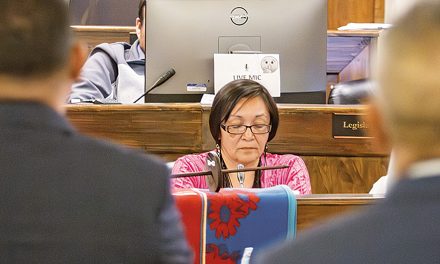
50 Years Ago: Appeals court sides with Nakai against Littell
Fifty years ago this week, Navajo Tribal Chairman Raymond Nakai may have won his biggest victory since becoming chairman of the Navajo tribe.
During the entire three years he served as chairman, Nakai had been in a bitter fight with members of the Old Guard on the tribal council, members who were committed to doing everything they could to destroy his administration because they supported the former chairman of the tribe, Paul Jones.
The council did everything they could to hurt Nakai, from spreading false rumors of mismanagement of tribal finances to taking away some of his powers and turning them over to someone else.
And the man the Old Guard turned to in efforts to destroy Nakai was the tribe’s general counsel, Norman Littell, who was probably the man whom Nakai despised the most. He despised him so much that during the previous three years Nakai did everything he could to force Littell to quit his $35,000 a year job as the tribe’s top attorney.
Nakai delayed giving Littell his monthly payments for several months until Littell filed a suit forcing Nakai to give him his money. Nakai also accused Littell of all kinds of underhanded tactics in his efforts to hurt the Nakai administration.
Ironically, Nakai had a powerful ally – U.S. Secretary of the Interior Stewart Udall, who has supported his position partly in an attempt to stop the infighting going on within the Navajo tribe for political reasons.
Udall had tried to fire Littell on a couple of occasions but Littell used his backing from the Old Guard, which controlled the council, to keep his contract, and also was not above going to court. A federal district court had ruled several months previously that Udall could not fire Littell as long as he had a valid contract and as long as he held the support of the tribal council.
Between 1963 and 1966, the Navajo Times has published more than 30 articles about the infighting between Nakai and Littell and, on a several occasions, staffers had written commentaries trying to explain to the Navajo people just how much this infighting was hurting the tribe and the Navajo people.
It’s difficult, even with the turmoil the Navajo people have seen within the tribal government over the years, to try to explain how this battle between two men could basically overshadow almost everything that had been going on within the tribal government since Nakai took office.
In fact, if someone read the articles that appeared in the Times and other local newspapers on the subject, one would have to wonder how Nakai and Littell had any time to do anything but try to get the other removed.
With that all said, news coming out of Washington, D.C. in late August and early September gave Nakai a great deal of hope that finally something could be done to remove Littell from the reservation once and for all.
Udall upped his efforts to bring the tribe back under control by urging officials for the Bureau of Indian Affairs to do whatever they could to seek a peaceful settlement of differences between the Old Guard and Nakai.
Then came a major victory – the U.S. Court of Appeals issued a ruling saying Udall did have the authority, if he wanted to, to fire Littell.
The court reversed the decision of the lower court and said that if Udall had “rational and valid reasons,” he could terminate Littell’s contract for just cause.
So what reason was Udall using to try to get rid of Littell?
Litell had supervision over a number of tribal attorneys who were paid by the tribe to handle tribal business. He also had a contract with the tribe to handle the various tribal claims cases against the federal government, for which he would be paid 10 percent of whatever money he managed to get from the claims.
The problem was that on the claims cases, he was supposed to pay all of his expenses and not use any resources he got from the tribe. So when Nakai and Udall found out that he had been secretly using tribal attorneys to handle a lot of the legal work for the claim cases, Littell was accused of stealing Navajo resources.
Udall was also upset at the agreement the Navajos had given to Littell in his role as the tribe’s counsel on oil contracts. Here again, Littell would get a percentage of the tribe’s income instead of billing by the hour and Udall claimed that with the wealth the Navajo Tribe had in oil reserves, Littell could be looking at as much as $40 million in compensation for doing less than 200 hours of work.
When this came up on the U.S. District Court level before District Court Judge John J. Sirica – the same man who some six years later became famous for his role in the Watergate case – Sirica had sided with him, saying Udall was “brutal and shabby” in his treatment of Littell.
But the appeals court ruling took note of the “steadily deteriorating relationship” between Littell and Nakai and the fact that one of Nakai’s campaign platforms was “Littell must go.”
They also took note of the fact that Udall had cancelled Littell’s contract in in October of 1963 and Littell had refused to accept it as long as he held the support of the majority of the tribal council.
The appeals court also noted that besides giving Littell $35,000 a year, the tribe was spending another $95,000 for several other lawyers to help him on tribal legal business.
“His use of salaried tribal employees to perform his work on claims cases without first getting approval was a clear violation of his contract,” the appeals court ruled.
So with this ruling, the Navajo people waited to see what would happen.
Would Udall’s termination of Litell’s contract actually take place or would it be stalled while Littell took the case to the U.S. Supreme Court?
To read the full article, pick up your copy of the Navajo Times at your nearest newsstand Thursday mornings!
Are you a digital subscriber? Read the most recent three weeks of stories by logging in to your online account.








 Highway 264,
Highway 264, I-40, WB @ Winslow
I-40, WB @ Winslow